#harivamsa
Explore tagged Tumblr posts
Text

Rukmini . Sri . Dwarkeshwari . Krishna's Soul
๋𓈒⊹ ꒰ O the one who sparkles by the beauty of all limbs! By all these I know that you the most beautiful, the daughter of the Bhoja king (Rukmini), are the second soul of Krishna ✧˚₊
श्रीरुक्मिणीचरणारविन्दार्पणमस्तु।

#Rukmini#mahabharat#ashtbharya#ashtmahishi#krishna x rukmini#Harivamsa#krishna#rukminikrishna#desiblr#rukmini krishna#hindublr#hinduism#rukmini#gopiblr#krishnablr#devotion#kanha#krishmini#mahabharata#dwarka#moodboard#desi#desi tag#desi tumblr#queensofdwarka#hindu gods#aesthetic
289 notes
·
View notes
Note
you mentioned harivansha and from what i know of scholarly stuffs it's much older than bhagavata purana so why do you think it isn't prominently considered for krishna's life? and what translations of harivansha do you use for your studies? i'm sorry if this seems too eager lololol
I'm answering this ask a year late, so I suppose that offsets your zeal (in a really horrible way)? This has been in my drafts, I just forgot about it entirely, thank you for coming to my inbox to remind me again. <3
Yes, Harivamsha was written much prior to Srimad Bhagavata Purana, and is considered some sort of appendix to the Mahabharata, which again is of greater antiquity. We can only speculate as to its relative lack of popularity, and I would like to mull over my own thoughts on this a bit more. I'll make a separate post, possibly. Let me just give a small introduction on the Harivamsha instead.
A Guide to Harivamsha
REFERENCES I USE IN MY STUDIES: (in no particular order)
1. Harivamsha Critical Edition (as edited by BORI, Bhandarkar Oriental Research Institute), EN-translated by Bibek Debroy.
Above-average translation quality. Compared to the others, the only benefit of this reference is that it lets one know what sections BORI cleaved—regarding which one must keep in mind that, as Debroy himself noted and as I observed in the course of reading as well, the editing of Harivamsha Critical Edition was in no way as well and expertly done as that of the Mahabharata Critical Edition (BORI).
2. Harivamsha Purana, Gita Press
The only complete and accessible translation (Hindi) of HV that there is. Great translation quality. You usually don't have to second-guess each line (like I have to, with No. 1).
3. Chitrashala Press edition of Harivamsa, Online EN translation by Desiraju Hanumanta Rao, A. Purushothaman & A. Harindranath. https://www.dvaipayana.net/harivamsa/harivamsa-cs-index.html
Very helpful, as you get the Sanskrit verses alongside the translated English ones, for comparison/tallying purposes.
4. Harivamsha Purana, EN-translated by M. N. Dutt (https://www.wisdomlib.org/hinduism/book/harivamsha-purana-dutt)
Most accessible translation; no big differences from No. 3 in interpretations. (I will take this opportunity to recommend Wisdomlib to practically everyone in this fandom.)
5. Krishna’s Lineage: The Harivamsha of Vyāsa’s Mahābhārata. EN translation by Simon P. Brodbeck.
Good translation, good language, immensely well-organised. Has family trees in a genealogical appendix.
GENERAL UNDERSTANDING OF HARIVAMSHA'S STRUCTURE:
The text is divided into 3 parvas, as follows -
Harivamsha Parva - This contains a lot of background information through the genealogies and stories interspersed in all the lineage talk. We get some important backstory for MBh, and we get some stories which you may find in most other Puranas. (Interestingly, this contains the Syamantaka incident. It was a really big deal, is all.)
Vishnu Parva - The main section of Krishna's non-MBh life-story, starting from his birth, the Mathura-era exploits (Kamsavadh, Jarāsandha's attacks), Rukmini-harana (my beloved), the Pārijāta story, and dealing with Pradyumna (his firstborn) and Aniruddha's (Pradyumna's son) lives as well.
Bhavishya Parva - The first chapters of this section are indeed about "bhavishya" (things that happen or "will happen" post-Swargārohana, prophecies about Kali Yuga, etc). Then there's a set of chapters that go into some of Vishnu's avatars (Varāha, Narasimha, Vāmana, in particular). These two sets of chapters are translated in almost all versions. Then comes the dicey part, the set of chapters translated only in Gita Press Harivamsha, and ironically, the most important part of Bhavishya Parva in my opinion (because it has major portions of Krishna's life-story. This section contains Paundraka's (and Ekalavya's) siege on Dwāraka, the killing of Hamsa-Dimbaka (Jarāsandha's closest allies that Krishna speaks of to Yudhisthira in MBh's Sabhā parva) etc. Invaluable for better understanding of Yādava politics, and kind of ties up some loose ends from MBh.
Lovers and collectors of obscure Krishna-katha (or even just Purana-katha in general), Harivamsha is the place for you! <3
#it's a queue peepuls#krishna#harivamsa#harivamsha#harivansha#bhagavata purana#translation#mahabharata#medha answers#(after a year and a few months)#puranas#hindublr
8 notes
·
View notes
Text

Just as flame is in fire, divine brightness is in the sun, and unfading charms are in the moon, so my love resides in you and you only. ~Harivamsa Purana Chapter 67 , Vishnu Parva
𝐒𝐀𝐓𝐘𝐀𝐁𝐇𝐀𝐌𝐀𝐕𝐀𝐋𝐋𝐀𝐁𝐇𝐀 𝐊𝐑𝐈𝐒𝐇𝐍𝐀 αи∂ 𝐊𝐑𝐈𝐒𝐇𝐍𝐀-𝐏𝐑𝐀𝐀𝐍𝐀𝐀𝐓𝐌𝐈𝐊𝐀 𝐒𝐀𝐓𝐘𝐀𝐁𝐇𝐀𝐌𝐀
port. sourabh raj jain as krishna and anushka shetty as satyabhama

They are on my mind since long. I had to.
@vishnavishivaa @mahi-wayy @yehsahihai @xxdritaxx @houseofbreadpakoda @ramayantika @warnermeadowsgirl @stxrrynxghts @mayakimayahai @chaliyaaa @celestesinsight @sambaridli @hum-suffer @sanskari-kanya @zeherili-ankhein @krsnaradhika @thegleamingmoon @ulaganayagi @voidsteffy @krishna-sangini @nidhi-writes @kaal-naagin @thecrazyinktrovert @sada-siva-sanyaasi @koklknthiapsara
#lord krishna#satyabhama#krishna satyabhama#krishnablr#Mahabharat#harivamsa purana#hindublr#desiblr#sanatanadharma#sanatanablr#khyati's moodboards and aesthetics#khyatikikalam
128 notes
·
View notes
Text
Favoured by you, he will follow your instructions. Remaining under your control, he will obtain great fame. He will be the best archer in the Bharata lineage. He will be like you and will not find delight in anyone other than you. O Purushottama! Bharata will be attached to you and you will be attached to him.
Reading the Harivamsa and I encountered Indra speaking to young Kanha about Arjuna and 🥺🥺😭
(Also Indra is so cute as a dad: he makes Krishna promise to take care of Arjuna when the two haven't even met, and counting the gazillion other ways he interferes and treats Arjuna is so soft 🥺)
61 notes
·
View notes
Text
The Tale of Nagnajiti: Krishna's Moon-Faced Bride

The Divine Princess of Kosala
Nagnajiti, also known as Satyā, was the cherished daughter of Nagnajit, the noble and pious King of Kosala. Blessed with unparalleled beauty and a serene, moon-like face, she was the jewel of her father’s heart. But her hand in marriage came with an extraordinary challenge—one that only a true hero could overcome. Nagnajiti was not alone in her royal lineage; she had sisters who were also known for their beauty and grace. According to the Padma Purana, her sisters were Sulakṣmaṇā and Suśīlā, who, like her, stood for self-choice marriage and chose Krishna as their husband. However, other texts, such as the Harivamsa Purana, mention her as Gandhari, adding to the variations in her story.

The Unconquerable Bulls
The king had set forth a daunting task for the suitors vying for his daughter’s hand. Seven sharp-horned and ferocious bulls, endowed with great strength and untamed fury, stood as the test of valor. Many mighty warriors and princes had tried and failed, their pride shattered before the beasts. Yet Nagnajiti, steadfast in her devotion, had already given her heart to one she had never met. She longed for Krishna, the Lord of Dwārakā, to come and claim her.

Krishna Arrives in Kosala
When Krishna, the Supreme Lord, arrived at the court of King Nagnajit, the princess’s heart soared with joy. She silently prayed, “If I have observed my vows with sincerity, may this sacred fire bless my wish. May He be my husband.” The mere sight of Krishna filled the court with divine radiance. The assembled kings and warriors watched in awe as He stepped forward to accept the challenge.

The Subjugation of the Bulls
Without hesitation, Krishna tightened His garments, expanded Himself into seven identical forms, and subdued the bulls with effortless grace. As if they were mere playful calves, He bound them together, displaying unparalleled strength and skill. The court erupted in astonishment, and King Nagnajit, overwhelmed with joy, declared Krishna victorious.

The Royal Wedding
With a heart full of gratitude and reverence, Nagnajit presented his daughter to Krishna. The divine union was sanctified in a grand Vedic ceremony, celebrated with immense splendor. As part of the gifts, the king bestowed upon Krishna ten thousand cows, three thousand exquisitely adorned maidservants, nine thousand elephants, and countless chariots and horses. The joyous occasion was unparalleled in grandeur.

The Battle Against Rival Kings
However, envious kings who had also sought Nagnajiti’s hand were furious at Krishna’s victory. As He departed with His bride, they ambushed Him on the way. But just as the bulls had been no match for Him, neither were these warriors. Krishna’s Yādava army, led by the mighty Balarāma, swiftly vanquished the opposition, ensuring a safe journey to Dwarka.

The Eternal Love of Neela Devi
Nagnajiti was none other than the incarnation of Neela Devi, one of the three divine consorts of Vishnu—Sridevi (Lakshmi), Bhoodevi (Earth), and Neeladevi (Pleasure). Legends speak of Neela’s deep longing for Krishna from a previous birth (as daughter of Agni) when she had performed great penance to unite with Him. The boon granted to her by Vishnu had now come to fruition in her incarnation as Nagnajiti.
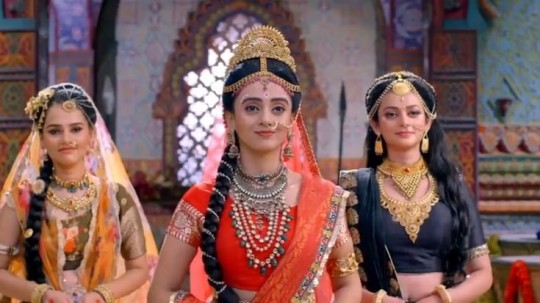

Her Life in Dwārakā and Legacy
Residing in Krishna’s grand palace, Nagnajiti became one of His eight principal queens, alongside Rukmini, Satyabhama, and others. She bore Krishna two sons, Mitrabāhu and Sunītha, according to the Padma Purana, or Bhadrakara and Bhadravinda, as stated in the Harivamsa Purana. She remained a devoted and loving wife, ever immersed in the divine service of her beloved Lord. Shrimad Bhagwatam says The sons of Nāgnajitī were Vīra, Candra, Aśvasena, Citragu, Vegavān, Vṛṣa, Āma, Śaṅku, Vasu and the opulent Kunti
Contradictions in Texts and Interpretations
Various scriptures present differing accounts of her identity and origins. The Padma Purana names her as one of three princesses of Madra who chose Krishna in a svayamvara, while the Harivamsa Purana refers to her as Gandhari, daughter of the king of Gandhara. Some interpretations associate her with Nappinnai of Tamil tradition, A Cowherd girl (Gopi), the divine consort whom Krishna won by taming seven bulls, reinforcing her connection to Neela Devi. She was daughter of Nandgo

A Love Beyond Time
Nagnajiti’s tale is one of unwavering devotion, divine fulfillment, and celestial love. She was not merely a mortal princess but an eternal goddess who sought and found her divine consort across lifetimes. Her moon-like face and serene grace continue to shine in the legends of Krishna, illuminating the path of devotion for generations to come.
artist - instagram • pinterest
#krishnablr#krishnacore#hindublr#gopiblr#desiblr#desi aesthetic#apricitycanvas#krishna#mahabharat#hinduism#desi tumblr#desi tag#my art <3#ai generated
25 notes
·
View notes
Text
Recently I saw this post by @god-has-adhd (I'm not reblogging it because I saw the people they tagged and realised very quickly that it's quite likely that us reblogging the post will be unwelcome, to put it mildly. I'm tagging the OP here anyway since it's a direct response to the post and it seemed only fair to engage in the conversation. I hope they don't mind.) OP urged everyone to watch the video regardless of the political leaning so in the spirit of giving everything a fair shot, we watched it. 'We' here refers to both me and Mod G. There are things we agree on with the guy speaking in the video and there are things we disagree with/think he didn't properly research. However, there is one thing that's most relevant to this blog and to me, personally so I'll be talking primarily about it. This is your long post warning, I'm afraid.
------------
"The Real Story of Eklavya"
The context for people who haven't watched the video is that the guy brings up two stories, one of Satyakama Jabali from the Upanishads and that of Eklavya from the Mahabharata. He brings up both these stories in the context of caste, he helpfully titles it and everything.
What I found interesting is that he frames himself talking about the story with the words "The real story of Eklavya". If you know even the basics of storytelling or filmmaking, you know that this is quite important. This implies that you, the viewer, do not know the real story and the one you know is either incomplete or false.
He begins, in a memorable instance, by asking ChatGPT for a summary to grasp the popular interpretation of the story of Eklavya and Drona. I have THOUGHTS about using a machine learning tool that is trained on data that is infamously biased and lacking when it comes to anything that isn't American, but that would be digressing from the point. ChatGPT provides him a summary that mentions that Eklavya was denied Drona's tutelage because he was of a lower caste. After this, the guy proceeds to recite the lines where Eklavya is mentioned in the Adi parva of the Sanskrit Mahabharat that we refer to as Vyasa's Mahabharat. He expresses surprise at how Eklavya is introduced as being the son of the "king" of the nishads (I think leader is a better word that should've been used but the Sanskrit text has a notorious habit of having just really questionable ways of referring to people, if you've read it you know.) Which is found HILARIOUS. Bro, what do you mean you're surprised? This is COMMON knowledge, I fear.
He mentions how being the son of the nishaad's leader/king effectively puts him on the same level as Arjun and that they're both princes. He says that this means Eklavya isn't shudra or dalit (there is a word that's curiously absent here that I'll mention in a bit.) Now, this one of those parts where the choice information he presents the viewer with is bizarre. Since I promised I'll give it a fair shot, I'm giving him the benefit of the doubt and assume this is a fault of him not researching enough and not willful omission. Maybe he just doesn't know. The information he's given here is correct, mostly. What he DOESN'T explain is who the nishads, as a group are. I'll fill in the blanks for him.
The nishad are said to be a group of tribal people who reside in the hills. The text he reads out even has the word "tribal" in it but the guy sort of glosses over it? The nishads are sort of like an aggregate grouping of different tribal populations and not the name of a specific tribe. Kind of. But the mention is still significant. See, the Mahabharata, especially the Sanskrit text, has this Thing™ that it does where it's incredibly rare to find a mention of tribal populations who are said to be human, many of the other mentioned tribal groups are demi-humans or non-humans or just straight up rakshahsas.
Eklavya is said to be the adopted son of Hiranyadhanus, the aforementioned king/leader of the nishads. The Harivamsa Purana part of the Sanskrit text (which is a giant-ass genealogy section where it traces the family line from the start of existence to the birth of Krishna) mentions that biologically he's the son of Devashrava, Vasudev's brother, which makes him Krishna's cousin by blood. Eklavya was abandoned by Devashrava in the forest and Hiranyadhanus found him and raised him as his own.
This makes Eklavya a tribal boy, I would use the word adivasi but people might disagree so I'll just say he has a tribal heritage, not by blood but by his upbringing. The man in the video says that Eklavya isn't a shudra, or dalit or untouchable, which is technically true. There's a missing word here that's doing a lot of heavy lifting for him, though. He says that Eklavya is a Kshatriya, which is DEBATEABLE because in the epic we've seen time and time again that blood doesn't matter and it's the society that does. With this, hopefully not to y'all, new information we might understand how the guy's assertion that Arjuna and Eklavya are on equal footing is shaky at best.
He continues to explain that in the text the reasoning why Drona refuses Eklavya is because he'd already promised he'd make Arjun The Best Archer. Since, he's bound by obligation to the Kurus, he can't afford to let Eklavya outshine his kuru students. The man proceeds to assert that in the text there is no caste-based discrimination happening here. Ergo, he concludes, the story of Eklavya doesn't have a caste aspect to it. If you believe otherwise, you're uneducated and need to learn the Truth and not fall into Propoganda. (I'm trying to be charitable to the guy but his tone when he says the word "propoganda" is dripping with disdain and it's making it very hard for me to remain charitable.) He ends this section this way.
This guy says he's given you all the facts. He's cited his source and he's said the complete truth. He hasn't. In this man's viewpoint, the complete and true Mahabharat is the Sanskrit text. Which, as you know, ISN'T what the entirety of the Mahabharat is and claiming that it is is a narrow perspective to see it. (Which is FUNNY considering this guy has a whole section towards the end of the video about Nuance and it's ironic that he's unwilling to provide the same nuance about the epic to his trusting audience.) Maybe he just isn't insane enough like me to know that it isn't the entire Mahabharat. It's possible.
There is a viewpoint that declares that the Sanskrit Text is the primary source and everything else isn't "canon". There's a SPECIFIC word for it but I will not say it because it's like a boogeyman word on hindublr, at least, so I'll omit the word in this post. This man, from what I've seen, shares this viewpoint.
I disagree.
The Mahabharat, is first and foremost a collection of oral traditions of storytelling that were written down much later. This means that the entire corpus of work that is this mammoth of an epic consists of the thousands of written texts, poetry, plays, songs, folk tales, recently it also includes cinematic adaptations, bedtime stories that your elders might have told you, and lastly, popular culture for better or for worse. This is my viewpoint and I feel it provides for a much better lens to engage with the story. Otherwise, you're denying the story of the rich tradition and heritage it was forged in.
The guy in the video wonders why the story of Eklavya is more popular than Satyakama Jabali and there are a lot of reasons for it. First is that the epic is simply more popular and, in many ways, more fun than the upanishad stories. Second is that the story of Eklavya captured people's minds because it's a story that has strife and the ending is unsatisfactory. Tragedies inspire emotions and connection in a way that comedies do not. There are many more reasons but I'll stop listing them.
It's not a coincidence or happenstance that there are caste dynamics added in the popular interpretation of the story. There are even seeds of this in the Sanskrit text, if this guy is truly only looking at that alone, Eklavya being a tribal kid, the way his physical appearance is described in the text, the way he's stopped from sharing a space with the kuru princes etc. If a variety of people who have historically faced similar things especially when it comes to education and find themselves mirrored in Eklavya? That's not Propaganda, as the guy puts it. It's just how stories naturally evolve and grow. It's people reading between the lines. There's no conspiracy at play. Just people finding something to relate to when they cannot relate to any other character.
I can write essays on how caste and varna show up in the Mahabharat (and I might, if even ONE person asks me for it) but to sum it down, it's a task of examining exactly who and what KIND of people are absent from the story. The Invisible People, if you will. You can count on your fingers how many shudra, dalit and adivasi figures are in the Mahabharat.
Drona is a teacher who fails at being a teacher in this instance. (The Mahabharat in many ways is a story of people failing to do their Duty. There's a certain peacock feather wearing guy who does a whole song and dance about it. It can cover a whole book. It's quite popular. Maybe you've heard of it?) Even if you ignore the caste dynamics reading of it, you cannot deny that the man just sucked at being a teacher in that moment when he denied education to a student, whatever his reasoning may be. He brutally asks for the kid to maim himself and again, even the Sanskrit text describes this action of Drona as cruel. He creates a barrier for Eklavya to stop him from continuing to practice his archery.
It's not surprising that Drona is read as a stand in for an education system that sucks at being an education system that does its job. Again, it's not a conspiracy or propaganda. It's people trying to connect to a story through the prism of their life experiences.
It is not my place to tell people what to believe and what not to believe. It's not the guy in the video's either, despite what he says. People's interpretations are personal to them. What is my place is to remind people that it's wrong to deny people their interpretations. There are versions and interpretations of the story that I hate or dislike but I'm not standing here and telling you they're not the Truth. This is the nuance that Mahabharat requires that the guy lacks. This is also why I believe his sources and research is lacking in this department.
------------
Beyond Eklavya
There's a lot of other thoughts and things I want to share about the rest of the video. I'll try to summarise the highlights.
There's a part where he doesn't understand what systemic patriarchy means, exactly, even though he himself gave an EXCELLENT example of it towards the start of the video with Satyakama Jabali's mother's heritage not being considered when it comes to his gotra. It was frustrating because he SAID it. He said the perfect example himself. I almost thought he set it up as a complete circle moment but he hadn't.
I appreciate him bringing a Shaivite perspective because I'm honestly tired of so much Vaishnavism at all times. I love to see different schools of Hinduism actually being practiced and not just one dominating and subsuming the others.
Towards the start of the video, Mod G predicted that the man would go on a "Periyar sucks" rant and I was so delighted that G was so right.
The guy in the video neglects to look at any contemporary research and scholarship about the linguistics and the Aryan migration theory(which he calls the invasion theory, obviously) including the genetic studies.
There's a funny bit where whenever the guy mentions Ambedkar he has to assert that he thinks Ambedkar is anti-hindu. Even when he's praising him. It happened multiple times.
-------------
TL;DR The man in the video fails to provide his viewers with the full picture about the story of Eklavya even when he claims he is.
- Mod S
ALSO
The structure of his arguments are poor especially in the section where he talks about why the North-South divide came about. Does he not know about the field of linguistics and how root languages are established? Telugu as a language has a 'Dravidian' (he seems to hate that word, even though Dravida is not just the anglo word for the southern parts of India) root because of certain features it has. Notice how North Indian languages use Gender. And then, notice how Southern/central or even Adivasi languages use gender. One main reason why Dravidian languages have been speculated to have another root language different to Sankskrit is the counting systems. Its not wrong to say Telugu has sanskrit INFLUENCE, but again, look at WHICH people within the language group use that type of Telugu (spoiler alert, its the 'proper' upper castes). He dismisses that entirely and makes it a whole issue about how the North South divide happened.
Its very clear to me that he has no intention of representing any of the counter arguments to his premise in an honest manner and is instead single mindedly trying to create more propaganda.
-Mod G
#is this the longest post on this blog#EVER?#possibly#I'm sorry#about being insane about the Mahabharat again#but I would argue that you all signed up for it#when you started following us#eklavya#hindu mythology#mahabharata#Mahabharat#hindublr#I'm tagging specifically because the original post was in the tag#desiblr#not an incorrect quote#mod: s#mod: g
89 notes
·
View notes
Text

sAvitrI chApi devAnAM mAtA mantragaNasya cha | kanyAnAM brahmacharyatvaM saubhAgyaM pramadAsu cha ||2-3-13
You are sAvitrI (one of the sixteen mAtR^i-s). You are the mother of devA-s and incantations. You are the celibacy of unmarried girls and conjugal bliss (saubhAgyaM) of married women- Chapter 3, Vishnu Parva, Harivamsa.
A Mahadevi form a day (1/9)
Shubha Navaratri!
May Jagadamba in every form always be with you and protect you!
#durga#kaali#lakshmi#sarasvati#shaktiblr#deviblr#amahadeviformaday#navaratri#sanatanadharma#sanatana aesthetics#navaratri aesthetics#krishna#shiva#brahma#vishnu#bhagavati
34 notes
·
View notes
Photo
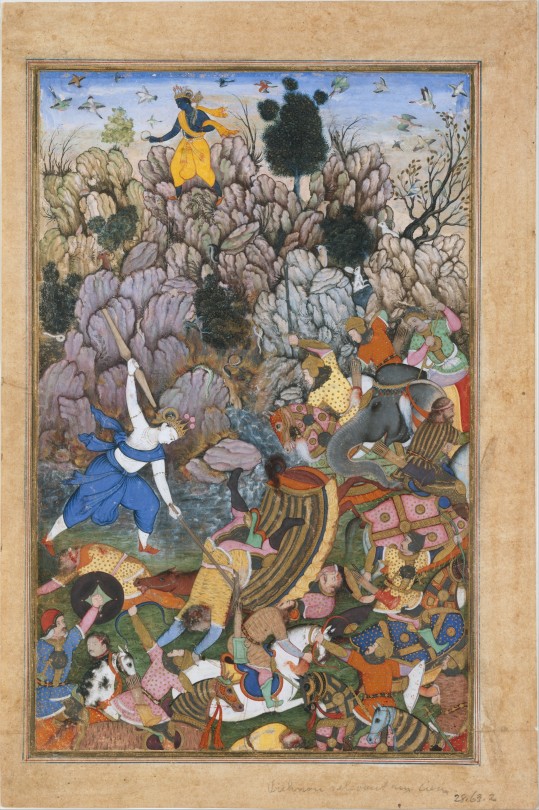
"Balarama and Krishna Fighting the Enemy", Folio from a Harivamsa (The Legend of Hari (Krishna)). ca. 1590–95. Credit line: Purchase, Edward C. Moore Jr. Gift, 1928 https://www.metmuseum.org/art/collection/search/448184
#aesthetic#art#abstract art#art museum#art history#The Metropolitan Museum of Art#museum#museum photography#museum aesthetic#dark academia
21 notes
·
View notes
Photo
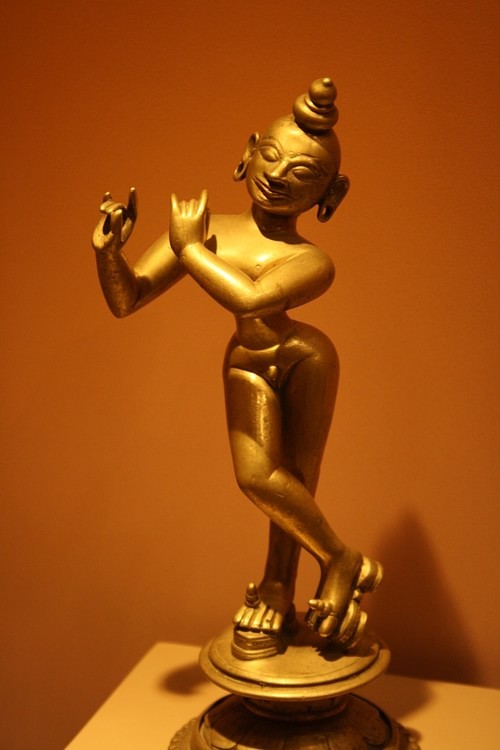
Krishna
Krishna (Krsna or Hari Krishna) is a major god of the Hindu pantheon and considered the eighth incarnation of Vishnu. He is perhaps the most popular of all the heroes of Hindu mythology. Krishna's adventures appear in the Mahabharata, Bhagavad Gita, Harivamsa, and the sacred texts known as the Puranas where he is described as the Supreme Being and creator of the universe.
The most ancient tales of Krishna in sacred texts involve his adventures with the Pandava princes whilst later, stories accumulated over the centuries which describe his eventful youth, when Krishna used his proficient weapons skills to good effect to defeat a host of fearsome enemies, demons and monsters.
Family & Adventurous Youth
According to tradition Krishna belonged to the Yadava - a pastoral race - and the god's birth is picturesquely described in the Mahabharata. One day Vishnu, the great Hindu god pulled two hairs from his own head, one white and one black. The black hair was planted into the womb of Devaki, a princess of the city of Mathura, and so Krishna was born into the Pandava family, his earthly father being Vasudeva. Unfortunately for Krishna his mother's brother, Kamsa, had been warned that Devaki's eighth child would kill him, and so Kamsa determined to murder the eighth child, a crime he had already carried out seven times before Krishna was born. Fortunately, Vasudeva took the precaution of hiding Krishna in the remote village of Vrindavana where the boy was brought up as a simple cowherd (in this guise he can be referred to as Govinda). There he spent an idyllic childhood and stirred the hearts of many gopis or herd-women with his dark good looks, playful charm, and mastery of music and dance.
Thus the story of Krishna contains a double concealment - Krishna is both a god disguised as a mortal and a prince disguised as a commoner. Accordingly, the myths contain many metaphors of disguise, such as a spark within a pile of ashes or a mighty sword in its scabbard, and these hint at Krishna's dual purpose as the punisher of human deeds but also as a bringer of enlightenment.
Krishna's foster parents at Vrindavana were Nanda and Yashoda, his sister is Subhadra, and his brother Balarama. Krishna's favourite consort was the cowherd woman Radha (or perhaps even his wife if they married in secret, as some sources claim). Tradition has it that the god actually acquired 16,108 wives and fathered 180,000 sons. Queen Rukmini, an earthly form of the goddess Lakshmi, is considered Krishna's second most favoured wife after Radha. With Rukmini, Krishna had a son, Pradyumna, and a daughter, Carumati.
Krishna was involved in many escapades in his adventurous youth. Notable amongst these are his various killings and thrashings of prominent enemies such as the ogress Putana, the giant bull danava, the giant snake Kaliya, and the king of the Hayas (horses). Also swiftly dealt with was the scheming tyrant Kamsa – after whose beheading Krishna established himself as king of Mathura. Krishna slew many demons and demon kings: Muru and his 7,000 sons, Pralamba – who Krishna beat up using only his fists, Naraka – son of the Earth and who had accumulated a harem of 16,000 captured women, and the sea-demon Pancajana who looked like a conch shell and who lost his magic shell to Krishna which the hero carried thereafter and used as a trumpet. Krishna also found time to lift the mountain Govardhana to foil a terrible deluge sent by Indra, to conquer Saubha, the floating city of the Titans (daityas), got the better of the sea-god Varuna, and even managed to steal the divine discus possessed by the fire-god Agni. Against mere mortals Krishna also wreaked havoc amongst the Gandharas, Bhojas, and Kalingas, amongst others.
Continue reading...
35 notes
·
View notes
Text
Harivamsa mahapuran:
Ever since Lord Krishna had heard about Goddess Rukmini, he had begun to love her
Kajdksjxkskdkqksksks US FATHER USSSSSSS
#desiblr#suffer ye suhana nahi#desi tumblr#father was a simp and so am i#INHERITED my romace#krishnablr#krishna#rukmini
29 notes
·
View notes
Photo
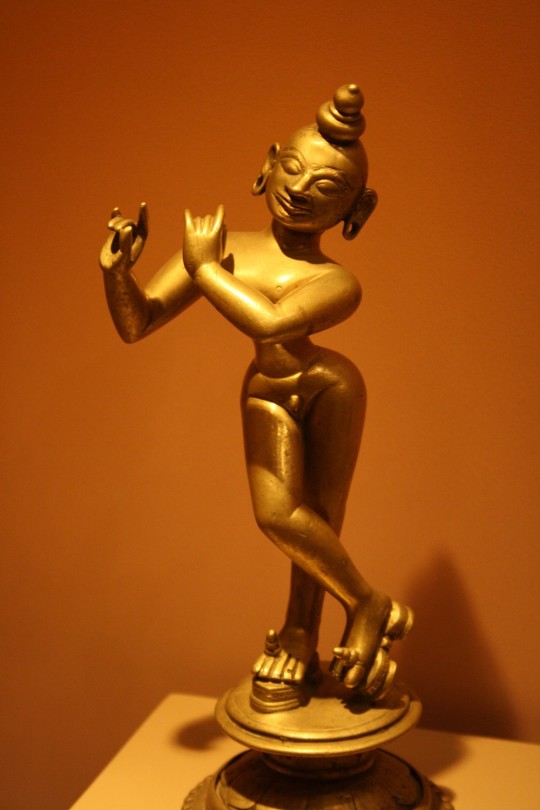
Krishna
Krishna (Krsna o Hari Krishna) es un dios importante del panteón hindú y se considera la octava encarnación de Visnú. Es quizás el más popular de todos los héroes de la mitología hindú. Las aventuras de Krishna aparecen en el Mahabharata, el Bhagavad Gita, el Harivamsa y los textos sagrados conocidos como los Puranas, donde se le describe como el Ser Supremo y creador del universo.
Sigue leyendo...
6 notes
·
View notes
Note
Whenever i reread the Rukmini Svayamvar leela i giggle so much like HELLO?? THE ROMANCE?? SRIMATI RUKMINI BEING AN ABSOULTE CUTIE?? KANHA?? AHHH *swoons and falls dramatically on the floor*
(for the ones who dont know)
A lot of people only know about Rukmini Haran, but Harivamsa (Mahabharata) also gives a detailed account of Rukmini Svayamavar, to which the Yadavs weren't invited. However, Krishna being dramatic as usual (especially for his Shris) decided to disrupt the occasion. Apparently, he was so formidable and intimidating that even the Kings participating in the event requested King Bhishmak to wed Ma Rukmini to Krishna right now in order to pacify him. But as we know, Kanha lets Shri decide the auspicious time for their divine union. (btw Krishna is still in Mathura i.e, Dwarka isn't built just yet.)
Shri Krishna then proceeds to give a speech to the entire Royal court revealing the true nature of Shri Rukmini as Parashakti who has descended on earth upon the request of Brahma and other gods. Being the supreme goddess herself, she deserves only to be wedded to the Supreme lord and not to some mortal king.
" Lord Krishna: O king, I reveal to you an eternal truth, devoid of any deceit. Your daughter Rukmini, upon hearing my words, shall determine the most auspicious course of action. For, at the behest of Brahma himself, she has incarnated in your household as Rukmini, she is the supreme goddess Shri herself "
"She transcends mortal existence, and her presence at the svayamvar amidst human kings would be travesty. As the supreme Goddess, her dharma dictates that she unite with the supreme one alone."
श्रीरुक्मिणीचरणारविन्दार्पणमस्तु ।
BONUS:
*swoons with you*
*Kanha also swoons hearing about his beloved Rukmini*
Shri Rukmini : giggles and shakes her head at all of us
#rukminikrishna#rukmini#krishna#someday i am gonna make a separate post for it#his speech about her also feels like he is addressing all the people of kaliyug who dare disrespect her#hinduism#hindublr#krishnablr#devotion#krishmini#desiblr#dwarka#gopiblr#mahabharata#ashtmahishi#ashtbharya
98 notes
·
View notes
Text
Beside Lord Krishna, if any others avatar of Lord Vishnu did ever used Sudarshan Chakra? If yes, then when?
Yes!!
Varaha avatar of Lord Vishnu used Sudarshan Chakra to kill Hiranyaksha.
Afterwards the highly powerful Hiranyaksha discharged a burning Sakti on the breast of the boar-formed Narayana which filled Brahma with surprise. Seeing that Sakti about to fall upon him the highly powerful Boar, setting up a roar, felled it on the ground. Thereupon the Lord, whirling his sunny discus, shot it on the head of the Danava king. Like unto the summit of the mount Meru clapped by a thunder-bolt the Daitya-king fell down dead on earth; on his death, all the Daityas filled with fear, fled away on all sides. ( Source :- Harivamsa Purana — 3.35 )
Although every incarnation of Lord Vishnu can use Sudarshan Chakra, but each of his incarnations has a special meaning, that is why Sudarshan Chakra was not used in those incarnations.
#lordvishnu#lordram#lordkrishna#lordshiva#lord krishna#hare krsna#krsna#vedic astrology#vedas#vedic jyotish online#harekrishna#krishna#astrology#hare krishna#vedic astro observations#astrology numerology vedicastrology
2 notes
·
View notes
Text
SANJNA // HINDU GODDESS OF CLOUDS
“She is a Hindu goddess associated with clouds and the chief consort of Surya, the Sun god. She is mentioned in the Rigveda, the Harivamsa and the Puranas. In Hindu mythology, Sanjna is the daughter of the craftsman god Tvashtr, often equated with Vishvakarma. Renowned for her beauty, virtue, and ascetic powers, Sanjna married Vivasvant (Surya); however, she could not endure his intense form and energy. To escape, she substituted herself with her shadow or maid, Chhaya, and ran away by transforming into a mare. Upon discovering her absence, Surya had his radiance diminished and brought her back.”
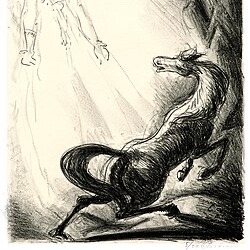
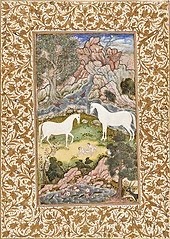
(left print is of ‘Surya reveals his new form to Samjna (in her mare form)’ and right illustration is of the Birth of Ashvins)
0 notes
Text
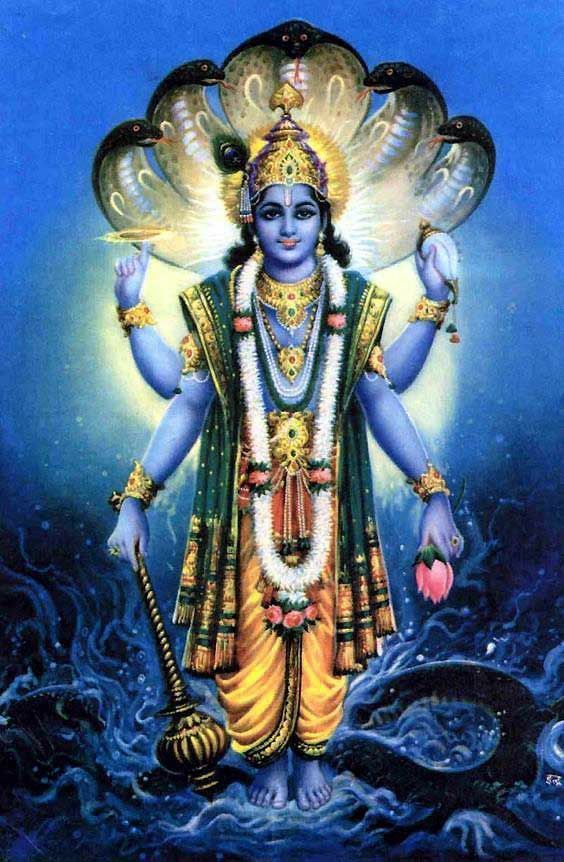
Lord Siva: Because you are said to exist as atoms in everything, you have been given the name Vishnu. You always cause auspiciousness. Hence, you are Shankara. Because of your vastness and huge nature, you are spoken of as the formless Brahman. - Harivamsa (3.88.43-46)
1 note
·
View note
Text
85 Hr Prenatal / Postnatal Yoga TTC in Kerala: Transform and Elevate Your Practice to New Heights
Yogakulam Academy now conducting an 85 Hours Pre/Postnatal Yoga Teacher Training Course in Kerala. Pregnancy is the most divine, beautiful and exciting phase in every woman’s life.
We are very grateful to our Vedas, Yog and our rishi, munis for giving us amazing knowledge of Yoga for Pregnancy which describe Pregnancy as a divine journey as pregnant lady has the power to create and nurture a new life within her.
10 days 85 Hour Pregnancy yoga teacher training program is designed with the guidance and suggestions of Ayurvedic doctors and Gynaecologists.
It covers philosophical and anatomical concepts of all 3 phases: Pre-Conception, Antenatal and Postnatal, philosophical concepts inspired from our ancient scriptures such as Garbha Upanishads, Samkhya Yog by Kapil Muni, Slimed Bhagwan Geeta by Lord Krishna, Puranas (Skanda Purana, Sri Harivamsa Purana and Srimad Bhagwat Mahapurana by Vyas Ji); Garbh Samskara from Ayurveda led by certified Ayurvedic Doctor; practice of asanas and yogic practices from Garbha Upanishads that can be practiced during all the 3 trimesters.
#Yoga Teacher Training#yoga teacher training Bengaluru#yoga teacher training bangalore#yoga teacher training retreats#Best yoga teacher training in Bengaluru#Bengaluru Yoga Teacher Training#Top yoga teacher training in Bengaluru#85 Hrs Prenatal Yoga Teacher Training Course#85 Hour Prenatal and Postnatal Yoga Teacher Training Bangalore#Prenatal Yoga Teacher Training#Postnatal Yoga Teacher Training#Best Prenatal Yoga Teacher Training#Best Postnatal Yoga Teacher Training#best pregnancy yoga teacher training#200 hour yoga teacher training Bengaluru#200 hour yoga teacher training bangalore#200-Hour Yoga Teacher Training Course#200 Hours Yoga Teacher Training Course#200 Hours Weekdays YTTC - Bengaluru#200 Hours Weekend YTTC - Bengaluru#200 hrs yoga teacher training#200 hour yoga teacher training#200 hours yoga teacher training#200 hr yoga teacher training#Best 200 Hours Weekend YTTC in Bengaluru#Best 200 hour yoga teacher training Bengaluru#Best 200 Hours Weekdays YTTC - Bengaluru#online yoga teacher training#yoga teacher course online#Online Yoga Teacher Training Courses
1 note
·
View note